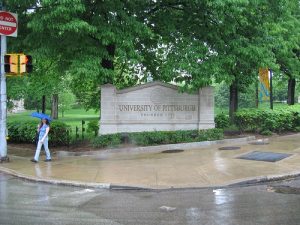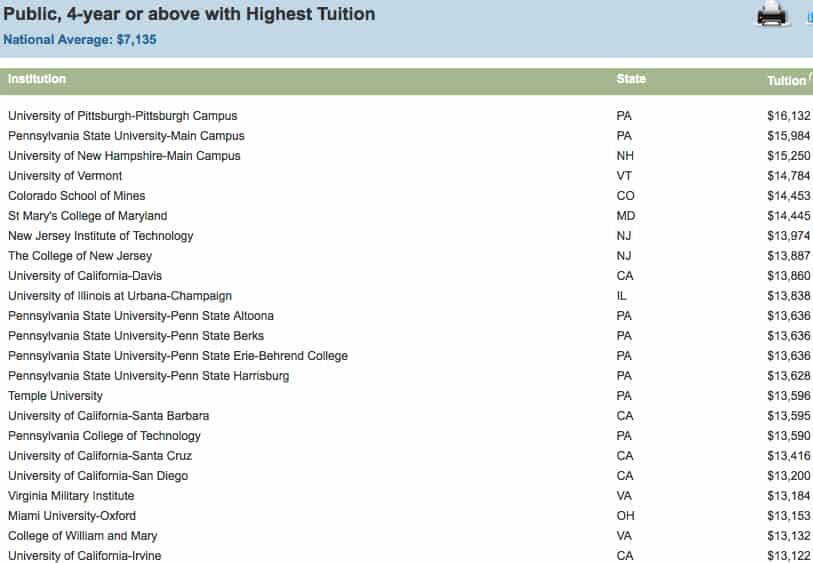
I want to thank everyone for such thoughtful and helpful responses to the dad who is stressing out about encouraging his daughter to walk away from an expensive acceptance from Boston College and instead trot off this fall to the honors college at the University of Pittsburgh.
I think it’s safe to say that there was an overriding consensus that the daughter made the correct decision, however, reluctantly she might have arrived at it. I too agree that she made the right choice.
If you missed the original post and what many other parents had to say, including those whose children have attended Pitt’s honors college, click the link below to can catch up on the discussion:
Having Second Thoughts About the University of Pittsburgh
Here are some of my thoughts on the issue:
1. Paying $60,000 for 34 weeks of college
Unless money isn’t an issue and it almost always is, I don’t think it is worth paying $60,000 for 34 (give or take) weeks of schooling!
According to the College Board, Boston College’s tuition and room/board costs are $58,506 and that doesn’t include such expenses as books and travel. Boston College provides few merit scholarships – just 22 freshmen scholarships in that last statistics I saw – because the school has no trouble attracting rich students.
Boston College doesn’t need to offer carrots because the school has a high enough ranking to impress parents, it’s got a recognizable brand name and it’s located in a city on the East Coast.
2.Worrying about the rankings.
I had a visceral reaction when I read that the dad was worried that Boston College’s ranking as the 31st best university according to US News & World Report makes it a better choice than University of Pittsburgh which is ranked at 58th. (Pittsburgh is actually tied with University of Maryland, Syracuse U., Fordham University and Southern Methodist U.)
It’s incredibly unfortunate that so many parents and teenagers believe that a higher rank automatically means a better school.
The rankings methodology is famously unsound. The rankings were started back in the 80s simply as a way for US News to sell more ads. With its rankings, US News (it’s not even a magazine anymore) does not even attempt to measure academic quality.
I devote an entire chapter of my book (The College Solution) to the rankings. Meanwhile here is a post that I wrote last year for my college blog over at CBS MoneyWatch that explains why the rankings are flawed:
4 Reasons to Ignore U.S. News College Rankings
3. Awarding scholarships to teenagers who don’t need them.
For many of its own residents, the state universities in Pennsylvania are financially out-of-reach. When you look at the federal list of state schools that charge the highest tuition, the University of Pittsburgh is at the top of the list along with Penn State and some Penn State satellites.
The federal government released its newest lists of hall-of-shame price offenders just this week. The lists reveal the state and private schools with the highest tuition and net prices.
Nation’s Most Expensive State Universities for Residents
While the Pennsylvania state schools have been become increasingly unaffordable to many of its own residents, they award merit scholarships to residents and outsiders who don’t need the assistance. I find this a craven practice, but it is a widely practiced one at state universities across the country.
Teenagers who are top achievers, as measured by test scores, class rank and standardized test scores, should have little difficulty finding state universities beyond their borders that will award them at least a modest merit scholarship.
4. Failure to use a net price calculator.
The drama that the dad and daughter have experienced could have been avoided if the family had explored what schools on her list would have cost BEFORE applying.
The parents should have run the net price calculator for each school and then had a discussion about how much they could afford. By doing so, schools like Boston College and the University of Virginia, which is prohibitively expensive for outsiders, would have been eliminated and replaced with schools more inclined to give the teenager a scholarship.
5. Don’t bank on graduate school.
 I think far too many college students think they should or need to go to graduate school.
I think far too many college students think they should or need to go to graduate school.
Pursuing a PhD in the humanities, in particular, can represent financial suicide and a bad career move.
For starters, there is a 50% attrition rate among students pursuing PhDs. The survivors face this cruel reality: the number of professors who are tenured or are on the tenure track has dropped dramatically over the years. Many PhDs are teaching as adjuncts making $2,000 or $3,000 a class without any benefits.
Andrew Roberts, a professor at Northwestern University and the author of The Thinking Student’s Guide to College, devotes one chapter of his book to providing excellent advice about graduate schools. He suggests that there are seldom strong reasons to go to graduate school immediately after college. Students often pick graduate school because all they know is how to be a student.
Many students apply to graduate school without seriously considering whether they really want to pursue the limited group of careers in which a particular graduate program culminates.
What do you think?
If anybody has any further thoughts on this topic, please feel free to share them below.
University of Pittsburgh photos by irishkh and Desiree N. Williams Creative Commons.



Awarding merit scholarships is craven? You realize, I hope, that many merit scholarships, including those at Pitt, are funded by endowments and donations that are legally bounded by donor intent, right?
Do you realize that Pitt actually isn’t even public? It is state-related, meaning it is privately governed, owned, and operated with non-preferred budget subsidization from the state in exchange for offering in-state tuition rates. Less than 9% of its annual operating budget comes from the state and that doesn’t even collectively cover the total in-state tuition discounts that Pitt provides to Commonwealth residents. And Pennsylvania is one of the lowest funders of higher education in the nation to begin with. Are you starting to get a sense why in-state tuition is so high for Pennsylvania schools?
And finally, tuition rankings are easily gamed by schools that stratify their tuition schedules based on class status. For instance, students at Penn State pay more when they are upperclassmen, making it more expensive over four years than it appears by the sticker price. Read the fine print on tuition rates.
I am a graduate of the University of Pittsburgh in English literature who went to graduate school in English (PhD University of Virginia) and is now about to be tenured as a college professor. If you live, eat, sleep and breathe it, you can make it happen. But you have to want to do that, and for much less money than others with similar or less education will get–and will get with much less effort.
I agree with most of your comments, Lynn. But it has become harder to receive merit scholarships from out of state public universities. The demand for some of the schools are so strong from quality, nonresident students that many primary (think Big 10 or Big 12) public universities can spend their money on students with true financial need. That is good on a policy basis, as you point out. And it leaves the families with excellent students with big tuition bills.
For example, it is not unusual for Chicago high school students to want to go to Big Ten state schools besides Illinois. I know of an honor student that will be attending Indiana next year and was accepted in their journalism school. Although the total cost for an out of state student is $44,000, she received only $4,000 in scholarships!
For many of these types of students, attending small, liberal arts colleges may be the best answer. These schools can be very generous with their financial aid for excellent students and they can provide a quality education. At a minimum, all families should research and visit some of these colleges during their search processes.
HI Chuck,
I completely agree with you. If you aim for a well-known, popular flagship university the most you could possibly hope for in most cases would be $4,000 to $6,000 a year in scholarships and that’s peanuts compared to the nonresident price. Students gravitate to these schools because they such a cramped view of what schools are worth attending. Liberal arts colleges, in many cases, will be cheaper and provide a better education for undergrads.
Lynn O’Shaughnessy
I would like to comment if I may on graduate school vs not going. While I agree about humanities, the advice I give to all the young scientists and engineers we hire is, “if you are thinking about a PhD, get it now, while you’re still in the school mode.” Once life, in terms of family, children, and job responsibilities catches up to you, it is much harder to go back.
While I have had what some would call a successful career, there are many job opportunities that remain closed to me because I don’t have the PhD. So I would tell any young person in the sciences, if you are even thinking about the PhD, go to grad school. Even if you decide not to continue, at least you went far enough to know if it was for you or not.